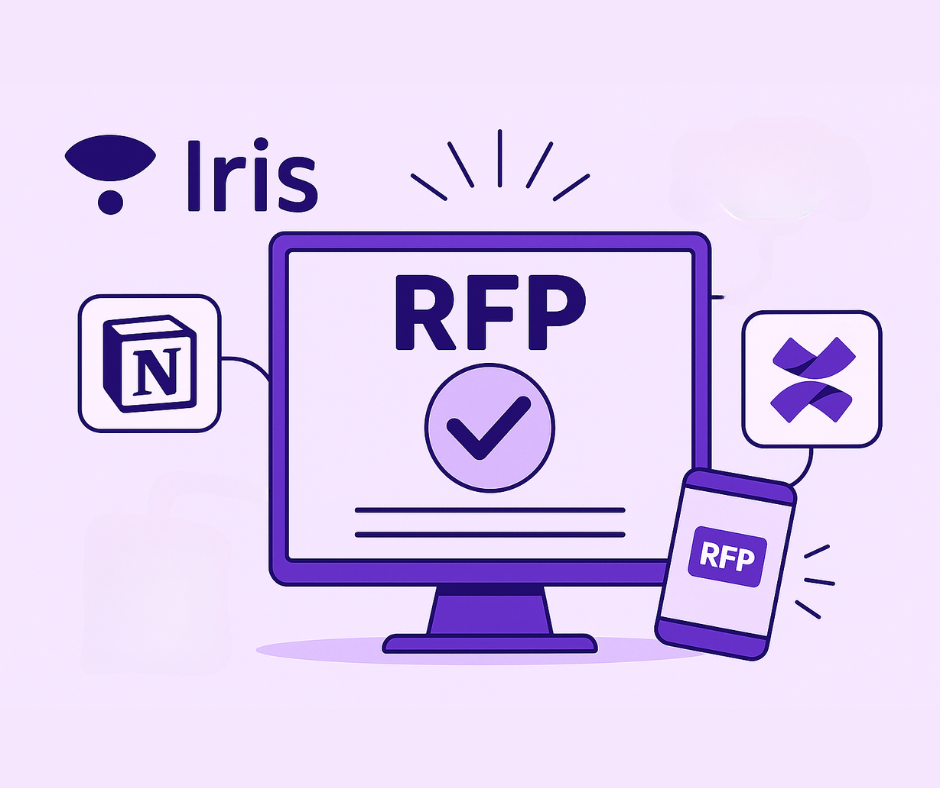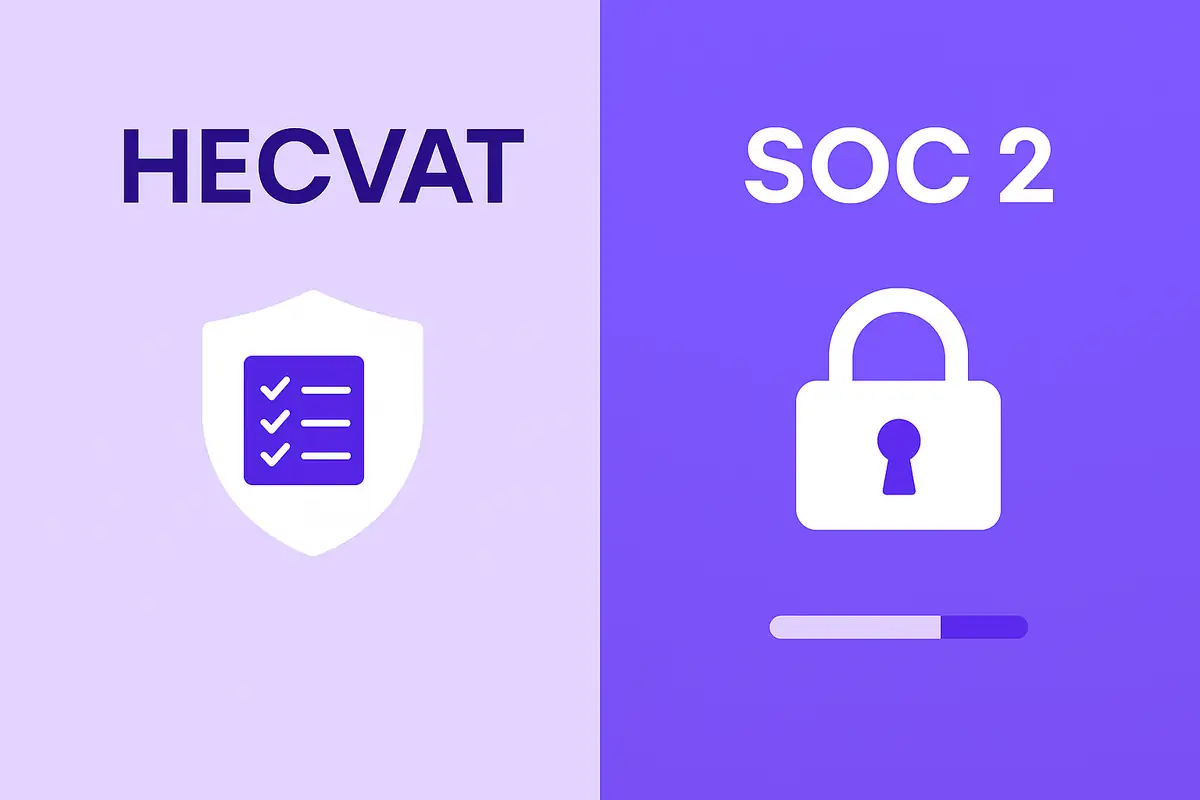4 Signs of Poor Collaboration Between Teams
June 17, 2025
By
Evie Secilmis

It always happens the same way. The deadline is closing in, and the one person with the critical answer is suddenly out of office. Now, the entire project is at risk. This isn't just bad luck—it's a sign of a fragile system. When your workflow depends on individual heroics, you don't have a resilient process. A strong team shouldn't be stalled by a single PTO day. If an out-of-office message can grind everything to a halt, it’s time to build a process that protects your progress and your people.
The AE thinks they’ve got it covered.
The RFP looks straightforward.
The deadline? Manageable.
Then the spreadsheet lands.
300 rows. 48 hours.
And the one person who actually knows the answer to Question 87?
Out of office.
If your process depends on live SME coverage to get responses out the door, PTO isn’t just a scheduling wrinkle—it’s a deal risk.
Let’s talk about what really happens when your subject matter expert isn’t around… and how to make sure it doesn’t stall the sale.
What is a Team, Really?
Before we can fix the process, we need to be clear on what we’re working with. The word “team” gets thrown around a lot, but it means something specific. It’s not just a collection of people who happen to report to the same manager or sit in the same Slack channel. A true team is a group of individuals who are fundamentally interconnected, working together to achieve a common, shared goal. The key ingredient is interdependence. Team members rely on each other for information, resources, and specific skills to get the job done. Think about your last big RFP response—the sales lead needed technical specs from the engineer, who needed security details from the compliance officer, who needed legal approval from counsel. No one person could have done it alone; their efforts had to be combined to create the final proposal.
The Core Definition of a Team
At its heart, a team is a group of people who share a common purpose and are mutually accountable for the results. Unlike a group of individuals who might just coordinate their separate tasks, team members actively collaborate. They share responsibility for both the process and the outcome. This shared ownership is what transforms a simple workgroup into a high-performing team. When everyone is aligned on the objective—like winning a specific deal—and understands their role in making it happen, the dynamic shifts from individual contribution to collective achievement. This structure is essential for complex projects where different perspectives and expertise are required to find the best solution.
More Than the Sum of Its Parts
This is where the magic happens. A well-functioning team creates synergy, meaning their combined output is far greater than what the members could produce individually. It’s the classic idea that 1+1=3. This happens because teams bring together people with complementary skills. The strategic thinking of a sales director, the technical depth of a solution architect, and the precision of a proposal writer all combine to create a response that is comprehensive, accurate, and persuasive. This synergy is what allows teams to tackle bigger challenges and produce higher-quality work, but it only happens when collaboration is seamless and information flows freely among all members.
Team vs. Group: Key Differences
It’s easy to use the words “team” and “group” interchangeably, but they represent two very different ways of working. A group is a collection of individuals who coordinate their efforts but are ultimately judged on their own performance. Think of a department of account executives who all have their own quotas. They might share an office and a manager, but their success is largely independent. A team, on the other hand, shares a common goal and succeeds or fails together. Team members are deeply reliant on one another to complete their work, and their performance is measured by the team's collective output, not just individual contributions.
Advantages and Disadvantages of Each Model
Both models have their place. Groups are great for efficiency in tasks that don’t require much collaboration, allowing individuals to focus on their personal growth and responsibilities. The downside is that they can miss out on the creative problem-solving that comes from diverse perspectives working together. Teams excel at fostering collaboration and synergy, which often leads to better outcomes and higher overall productivity. However, this collaborative process can be slower and less efficient without clear plans and systems in place. When team members can't easily access the information they need, the entire project can grind to a halt, turning a key advantage into a major bottleneck.
Common Types of Teams
Teams come in all shapes and sizes, and their structure often depends on their purpose and how their members interact. Understanding the type of team you’re on can help clarify roles, responsibilities, and the best way to work together. For instance, the team that assembles for a one-off, high-stakes RFP is very different from the standing sales team that works together year-round. Some teams are built for a specific project with a clear end date, while others are permanent fixtures of the organization. Recognizing your team's structure is the first step toward optimizing its performance and ensuring everyone is aligned and equipped to succeed in their specific context.
Teams Based on Purpose
One of the most common ways to classify teams is by what they are trying to accomplish. The team's purpose dictates its membership, timeline, and how it measures success. A team designed to launch a new product will operate very differently from one tasked with providing ongoing customer support. These distinctions are important because they influence everything from communication styles to the tools and resources the team needs. Whether they are temporary or permanent, these purpose-driven teams are the engines that move a business forward, turning ideas and strategies into tangible results through focused, collaborative effort.
Project Teams
Project teams are temporary groups formed to complete a specific, time-bound objective. Think of them as a special task force assembled to "make things happen." These teams are often cross-functional, bringing together members from different departments—like sales, marketing, product, and legal—to work on a single initiative, such as responding to a complex RFP or launching a new feature. Once the project is complete, the team disbands. Their temporary nature makes them agile and focused, but it also means they need to establish clear processes and communication channels quickly to be effective from day one.
Work Teams
Work teams, sometimes called functional teams, are the permanent groups responsible for the day-to-day operations of a business. These are the teams you see on an organizational chart, like the sales team, the engineering team, or the customer support team. Their work is ongoing, and they are directly responsible for producing products or delivering services. Unlike project teams, work teams have a long-term focus on continuous improvement and consistent performance. They are the backbone of the company, ensuring that core business functions are carried out efficiently and effectively every single day.
Virtual Teams
A virtual team consists of members who work together from different physical locations, relying on technology to communicate and collaborate. With the rise of remote and hybrid work, this model has become incredibly common. These teams span different time zones, offices, and even organizations. While virtual collaboration offers flexibility and access to a wider talent pool, it also presents unique challenges. Without the benefit of in-person interaction, virtual teams must be incredibly intentional about communication and rely on robust digital tools and a centralized knowledge platform to keep everyone connected and on the same page.
Self-Directing Teams
Self-directing or self-managed teams have the highest degree of autonomy. These teams are given a goal and are then empowered to decide for themselves how they will achieve it. They manage their own tasks, set their own schedules, and are responsible for their own performance. This model can lead to incredible innovation and high levels of motivation, as team members feel a strong sense of ownership over their work. However, it requires a high level of trust, maturity, and discipline from every member to be successful, as well as strong leadership support from the broader organization.
Teams Based on Interaction Style
Beyond purpose, teams can also be defined by how their members interact and rely on one another to get work done. This dynamic is crucial because it determines the flow of information and the nature of collaboration within the team. Some teams require constant, real-time interaction, with each person's task directly impacting the next. Others operate more like a collection of solo practitioners who support each other but work on their own deliverables. Understanding this interaction style helps in designing workflows and choosing the right tools to support the team's natural rhythm of work.
Interdependent Teams
In an interdependent team, members are highly reliant on each other to accomplish their tasks. The success of one person is directly tied to the success of the whole team. A proposal response team is a perfect example of an interdependent team. The proposal manager can't finalize the document until the solution architect provides the diagrams, who in turn is waiting on security details from the IT team. The workflow is sequential and collaborative, and a delay in one area creates a bottleneck for everyone else. This high level of dependency requires tight coordination and constant communication to keep things moving forward.
Independent Teams
In an independent team, members work toward a shared goal but primarily on their own individual tasks. How one person performs doesn't directly block another's progress, though they may share resources and offer support. A regional sales team is a good example. Each account executive is responsible for their own territory and quota, and their success is measured individually. While they are all part of the same team and contribute to the company's overall revenue goal, their day-to-day work is largely autonomous. They might collaborate on strategy or share best practices, but their core tasks are completed independently.
4 Signs Your Team Lacks a System for Collaboration
Just putting talented people in a room (or a Zoom call) and calling them a team doesn't guarantee success. In fact, without the right systems in place, it can create more problems than it solves. When collaboration is left to chance, chaos quickly follows. You start seeing the same issues pop up again and again, turning every deadline into a frantic scramble. These recurring problems aren't just minor annoyances; they are clear signals that your team's ad-hoc process is broken. Recognizing these signs is the first step toward building a more resilient, efficient, and systematic approach to working together. If any of the following scenarios sound familiar, it’s time to rethink your collaboration strategy.
1. You Waste Time Recreating Work That Already Exists
That SOC 2 response?
Answered three times last quarter.
But now it’s buried in a Slack thread or locked in someone’s desktop.
Without a structured, accessible knowledge base, your team ends up rewriting the same content instead of reusing what’s already right.
The cost?
Hours wasted. Inconsistencies introduced.
And the person covering starts guessing—because they don’t want to miss the deadline.
2. Your “Fallback Plan” Is Just a Chain of DMs
Someone always says, “I’ll just ping someone else who might know.”
So begins the Slack relay:
AE → proposal lead → legal → SE #2 → “I think John answered that last time?”
No one’s sure what’s final.
Version control disappears.
And now you’ve pulled three people into a problem one person had already solved—just not in a way the team could use.
3. Last-Minute Fire Drills Burn Credibility
You scramble. You improvise. You send the doc.
But the buyer spots the inconsistencies.
The compliance team follows up with questions your team can’t confidently answer.
And suddenly, your smooth sales process doesn’t feel so enterprise-ready.
The perception shifts:
From buttoned-up and responsive…
To rushed, unclear, and risky.
4. Institutional Knowledge Walks Out the Door (Even Temporarily)
When SMEs go offline, they take a part of your deal velocity with them.
Unless your process captures not just answers—but the context, tone, and ownership behind them—your velocity lives in someone’s head.
And if that person’s on PTO, so is your ability to respond.
The Hidden Dynamics of Teamwork
Those last-minute fire drills aren’t just bad luck; they’re a symptom of how your team is wired to work together. When one person’s vacation can derail a deal, it’s a sign that the team’s structure relies more on individual heroics than on a resilient, shared system. High-performing teams don't just have talented people; they have intentional ways of forming, thinking, and leading that make them greater than the sum of their parts. Understanding these hidden dynamics is the first step to building a response process that works, whether your top SME is at their desk or on a beach.
How Teams Form and Evolve
No team starts out as a perfectly oiled machine. Like any relationship, teams go through predictable stages of growth and development. A new proposal team, for instance, has to figure out its rhythm, establish trust, and define how to handle conflict when the pressure is on. Without a clear framework for collaboration, teams can get stuck in the early, inefficient stages, where simple tasks become complicated and deadlines feel impossible. Recognizing where your team is in its lifecycle can help you identify the friction points that are slowing you down and holding back your win rates.
The Five Stages of Team Development
Most teams move through five distinct phases, a model often called Tuckman's stages of group development. First, they’re Forming, where everyone is polite and figuring out their roles. Then comes Storming, where disagreements over process and priorities emerge—this is where many RFP responses go off the rails. If they push through, they reach Norming, establishing workflows and trust. This leads to Performing, where the team operates with confidence and efficiency. Finally, after the project is done, the team reaches Adjourning. A solid operational system helps teams move from storming to performing faster, creating a repeatable process instead of reinventing the wheel with every new deal.
Finding the Right Team Size and Composition
There’s a reason people talk about the "two-pizza rule"—if you need more than two pizzas to feed your project team, it might be too big. The ideal team size balances diverse expertise with clear communication. A team where everyone has the same background might agree easily but miss critical blind spots. On the other hand, a team with too many different stakeholders can get bogged down in debates. The key isn’t to find a magical number but to ensure the team has access to the right information, regardless of who is officially assigned to the response. This is where a central knowledge library becomes your most valuable player, filling in the gaps.
How Teams Think and Lead
The best teams seem to operate on the same wavelength, anticipating each other's needs and pulling information effortlessly. This isn't magic; it's what researchers call "team cognition." It’s a shared consciousness built from a common understanding of goals, processes, and—most importantly—who knows what. When this collective brain exists only in people's heads and private DMs, it’s fragile. The moment someone logs off, a piece of the team’s intelligence disappears. Truly scalable teams build an external, shared brain that everyone can tap into anytime.
Developing a Shared Team Brain
A "shared team brain" relies on two things: a shared mental model and a transactive memory system. In simple terms, everyone needs to be on the same page about the goal (the mental model), and everyone needs to know where to find the right information (the memory system). The problem is that, for most teams, the memory system is just other people. When you need a security detail, you ask Sarah. When you need a legal clause, you ask Ben. A platform that captures and organizes this expert knowledge creates a reliable, centralized memory system that doesn’t depend on any single person’s availability.
Rethinking Team Leadership
In a traditional model, one person—a proposal manager or sales lead—directs all the traffic. But this creates bottlenecks and puts immense pressure on a single point of failure. A more modern approach is shared leadership, where every team member is empowered to take ownership. This is only possible when information is democratized. When anyone on the team can confidently find the correct, approved answer to a question, they don’t have to wait for permission or direction. They can contribute proactively, which speeds up the entire sales cycle and allows leaders to focus on strategy instead of playing air traffic control for content requests.
Here’s What High-Performing Teams Do Instead
Modern teams don’t scramble when someone’s out. They systematize.
With Iris, your team can:
✅ Use AI to suggest responses from approved past work—no Slack sleuthing needed
✅ Route ownership to whoever’s available without losing context
✅ Protect sensitive answers with granular permissions and approval paths
✅ Auto-tag responses by use case, buyer type, or industry—so anyone can find what they need
✅ Submit inside portals with our Chrome extension—no formatting disasters or last-minute rushes
Because PTO shouldn’t break your process.
It should prove it’s strong enough to scale.
Establish a Single Source of Truth
The most common reason teams rewrite the same content is that finding the original is harder than starting from scratch. When your best answers are scattered across old proposals, email threads, and chat histories, you don’t have a process—you have a digital junk drawer. A single source of truth isn’t just a folder where documents go to die; it’s a living, searchable library of your company’s best knowledge. It’s the one place everyone on the team can go to find approved, up-to-date answers without having to ask anyone. This is where a dedicated response platform becomes your team's most valuable player, turning institutional knowledge into a reusable asset.
How a Centralized System Prevents Information Silos
When your top SME goes on vacation, they shouldn't take your deal velocity with them. But if your process relies on their personal knowledge, that’s exactly what happens. A centralized system prevents this by capturing not just the final answers, but the context, tone, and ownership behind them. It ensures that critical information doesn't just live in someone's head or their private inbox. Instead, that knowledge is documented and accessible, creating a collaborative environment where anyone on the team can confidently step in and find what they need. This breaks down information silos and makes your entire response process more resilient and scalable.
Provide Proper Training and Support
A new tool can’t fix a broken process on its own. For any system to work, your team needs to understand how and why to use it. True adoption happens when leadership provides strong support and invests in proper training. Think of it like the highly productive NUMMI car plant, which succeeded by implementing a new team structure backed by solid management. When you introduce a centralized knowledge base, show your team how it makes their jobs easier, reduces fire drills, and helps them win more deals. This isn't just about teaching them which buttons to click; it's about fostering a culture of shared knowledge and mutual team support where everyone is empowered to contribute and succeed.
Final Thought: Coverage Is a System, Not a Person
If your RFPs stall every time an SME logs off, it’s not a resource issue.
It’s a workflow issue.
The right platform makes institutional knowledge accessible, approvals trackable, and answers scalable—so your people can rest and your deals can move.
Your subject matter experts have earned their time off.
Let your system handle the rest.
→ Want to see how Iris keeps RFPs moving when your team is offline?
Frequently Asked Questions
Our main expert is super reliable. Is it really a problem if our process depends on them? It’s fantastic to have a go-to person who is always on top of things, but relying on any single individual creates a fragile process. This isn't about their reliability; it's about the system's resilience. When that person takes a well-deserved vacation, gets pulled into an urgent meeting, or simply has a busy day, the entire project can stall. A strong process ensures that work can continue smoothly, regardless of any one person's availability. It protects the deal from unforeseen delays and protects your expert from becoming a constant bottleneck.
What's the difference between using a shared drive and a dedicated response platform? A shared drive is essentially a digital filing cabinet. It can store documents, but it struggles with context, version control, and searchability. You still have to hunt for the right answer and hope you've found the most recent, approved version. A dedicated platform acts more like a team's collective brain. It doesn't just store content; it organizes it, makes it instantly searchable, tracks ownership, and can even suggest the best answers for new questions. It turns your past work into an active, reusable asset instead of a passive archive.
How do I get my team to actually use a new system instead of just messaging the expert anyway? Adoption comes down to making the new way easier than the old way. If finding an answer in the system is faster and more reliable than sending a Slack message and waiting, people will naturally choose the better path. This starts with leadership championing the process and ensuring the knowledge base is well-maintained. When your team sees that the system gives them immediate access to accurate, approved information, they'll stop seeing it as an extra step and start seeing it as their most valuable shortcut.
Won't creating a centralized knowledge base take a huge amount of time upfront? It's true that setting up any new system requires an initial investment of time. However, you should compare that one-time effort to the time your team currently wastes every single week. Think about all the hours spent searching through old emails, rewriting answers that already exist, and correcting inconsistencies. A structured approach, especially with modern tools that can help automate the process of capturing knowledge, pays for itself quickly by eliminating that recurring waste and speeding up every future response.
We're a small team. Is this kind of system overkill for us? Building a resilient process is a matter of habit, not headcount. In fact, the absence of one key person can be felt even more acutely on a smaller team where roles are less redundant. Establishing a single source of truth early on creates a solid foundation that allows your team to grow without breaking its workflow. It ensures that as you get busier and bring on new people, your process scales with you instead of becoming more chaotic.
Key Takeaways
- Your process is the real single point of failure, not your people. If an out-of-office message can derail a deal, it’s a clear sign your workflow relies on individual heroics instead of a resilient, shared system.
- Turn expert knowledge into a searchable, team-wide asset. Stop wasting time hunting for answers in old emails and DMs. A single source of truth makes your best content reusable and accessible, so anyone can build a high-quality response.
- Empowerment comes from access to information, not just people. When every team member can confidently find approved answers on their own, you eliminate bottlenecks and allow leaders to focus on strategy instead of directing traffic for content requests.
Related Articles
Share this post
Link copied!




















